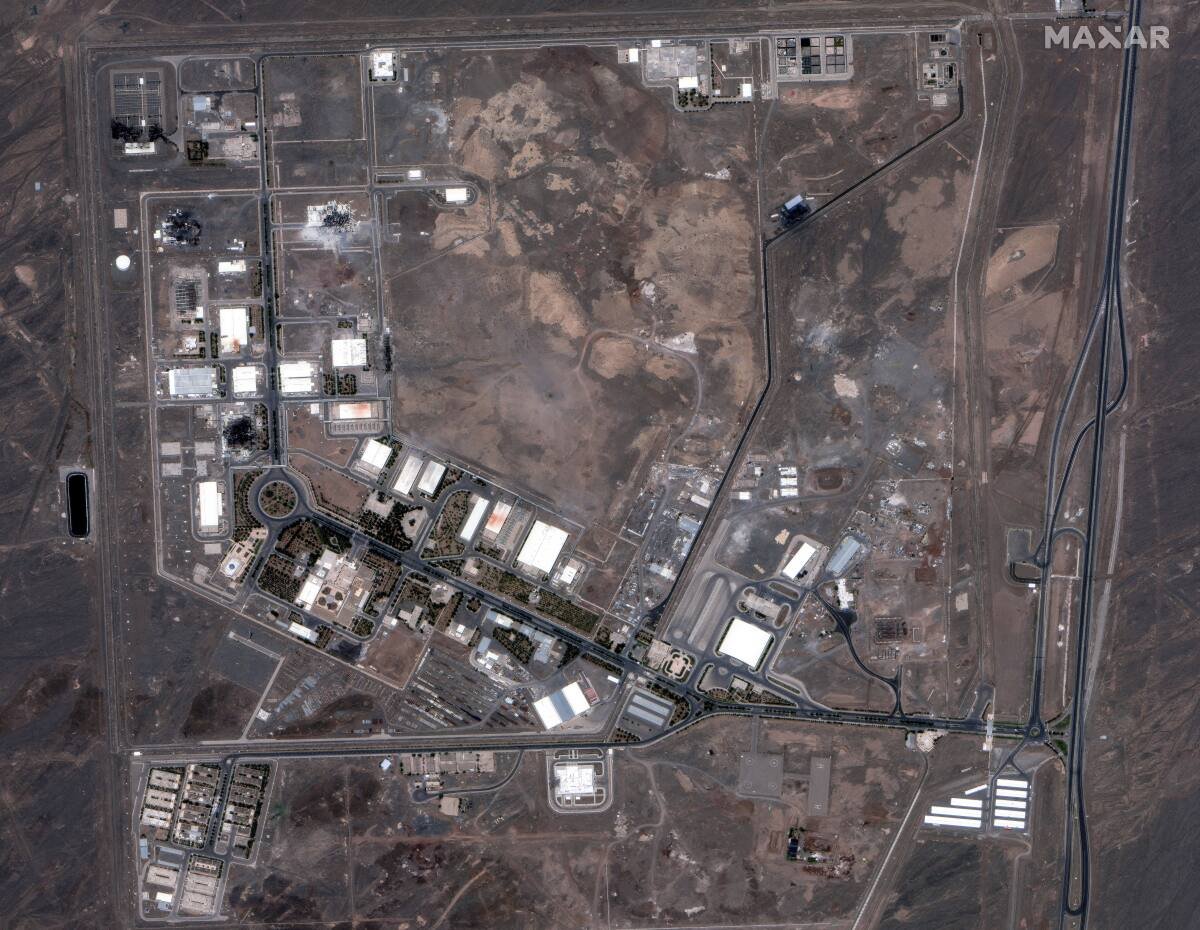WASHINGTON — Fallout from President Trump’s historic gamble to strike Iran’s nuclear facilities reverberated across the Middle East Sunday, as Washington braced for an unpredictable response from a cornered but determined Islamic Republic.
While the Iranian government downplayed the impact of the U.S. attack, noting the depths of its nuclear know-how built over decades of study, U.S. military officials said its precision strikes against Iran’s three main nuclear facilities caused “extremely severe damage and destruction.”
A senior Israeli official told The Times that Jerusalem was so satisfied with the operation that it was prepared to suspend hostilities if Iran ends its missile salvos against Israeli territory.
“We are ready to be done,” the Israeli official said, granted anonymity to speak candidly.
As the dust settled, the sun rose and satellite imagery emerged of the wreckage, the main question among Trump administration officials became how Tehran would respond — both militarily, against U.S. interests in the Persian Gulf and around the world, as well as with the remnants of its nuclear program, with so much of it destroyed.
Tehran’s nuclear-armed allies, in Russia and North Korea, have been critical of the military campaign, with former Russian President Dmitry Medvedev raising the prospect of Moscow giving Iran a nuclear warhead in response to the attacks.
The Israeli official dismissed that idea, alluding to direct talks with Moscow over the Iranian program. “We are not concerned,” the official said.
President Trump addresses the nation Saturday night about the U.S. military strikes on three Iranian nuclear sites. He is accomapnied by Vice President JD Vance, Secretary of State Marco Rubio and Defense Secretary Pete Hegseth.
(Carlos Barria / Pool via Associated Press)
Trump’s military action, dubbed “Operation Midnight Hammer,” was a contingency years in the making, prepared and much feared by Trump’s predecessors over two decades as a desperate last resort to a nuclear Iran.
Ever since Tehran resumed its fissile enrichment program in 2005, Republican and Democratic presidents alike have warned that the Islamic Republic could never be allowed to obtain a nuclear weapon. But a constellation of diplomatic talks and complex agreements have failed to dissuade Tehran from a fundamental principle of a “right to enrich” uranium — near to weapons grade — on its own soil.
Despite the dramatic nature of the U.S. air raid, few in Washington expressed an appetite for a prolonged U.S. war with Iran and echoed Israel’s interest in a truce after assessing its initial operations a success. Vice President JD Vance denied that the United States was “at war” with Iran on Sunday, telling CBS that the nation is, instead, “at war with Iran’s nuclear program.”
But the prospect of another full-scale U.S. war in the Middle East, made palpable by the weekend strikes, shook Capitol Hill on Sunday, compelling Democrats who have long advocated a tough approach to Iran to push for a vote to restrict Trump under the War Powers Act.
More than 60 members of Congress, including Senate Minority Leader Chuck Schumer and House Minority Leader Hakeem Jeffries, both of New York, called on the Trump administration to seek congressional authorization for any further action. At least one Republican, Rep. Thomas Massie of Kentucky, joined in the call.
The Pentagon said that seven B-2 Spirit stealth bombers deployed a total of 14 Massive Ordnance Penetrators — 30,000-pound bombs known as “bunker busters,” for their ability to destroy facilities buried deep underground — against Fordow, Natanz and Isfahan.
The U.S. operation followed an Israeli campaign that began last week with strikes against Iranian air defenses and nuclear facilities, scientists and research facilities, as well as against military generals, ballistic missile launch pads and storage depots.
While the United States and Israel believe that Saturday’s strikes were a strategic victory, some concern remains that Iran may have removed critical equipment and materiel from its site in Fordow — an enrichment facility that had been burrowed into the side of a mountain — to an undisclosed location before the U.S. operation began, the Israeli official said.
“That remains a question mark,” the official added, while expressing confidence that Israeli intelligence would be aware of any other significant nuclear facilities.
Addressing the nation on the attacks on Saturday night, Trump warned Iran that U.S. attacks could continue if it refuses to give up on its nuclear program.
“There will be either peace, or there will be tragedy for Iran, far greater than we have witnessed over the last eight days,” Trump said, flanked by his vice president, national security advisor and secretary of defense. “Remember, there are many targets left. Tonight’s was the most difficult of them all, by far, and perhaps the most lethal. But if peace does not come quickly, we will go after those other targets with precision, speed and skill. Most of them can be taken out in a matter of minutes.”

Satellite image shows the Natanz enrichment facility in Iran after U.S. strikes.
(Maxar Technologies via Associated Press)
Across the region Sunday, the question paramount on observers’ minds was what shape Iran’s response would take.
Iranian officials downplayed the strikes’ impact, acknowledging damage to nuclear facilities but that the know-how remained intact.
“They [the United States and Israel] should know this industry has roots in our country, and the roots of this national industry cannot be destroyed,” said Behrouz Kamalvandi, spokesman of the Atomic Energy Organization of Iran, according to a Sunday interview with the semi-official Tasnim News Agency.
“Of course, we have suffered some losses, but this is not the first time that the industry has suffered damage. … Naturally, this industry must continue and its growth will not stop.”
Hassan Abedini, the deputy political director of Iran’s state broadcaster IRIB, said the three targeted nuclear sites had already been emptied some time before the attacks and that they “didn’t suffer a major blow because the materials had already been taken out.”
Other officials, including leaders in the targeted areas in Natanz, Isfahan and Fordow, reassured residents there was no nuclear contamination as a result of the strikes and that they could “go on with their lives,” according to a statement Sunday from government spokesperson Fatemah Mohajerani.
The U.S. attacks drew swift pleas for restraint from Saudi Arabia and Qatar, both of which issued statements calling on all parties to de-escalate. Iraq, meanwhile, said the U.S. escalation “constitutes a grave threat to peace and security in the Middle East,” according to an interview with its government spokesman on Qatari broadcaster Al-Jazeera.
Oman, a key mediator in the negotiations between Tehran and Washington, was more scathing, expressing what it said was its “denunciation and condemnation” of the U.S.’s attacks.
In Europe, as well, governments urged caution and affirmed support for Israel.
“We have consistently been clear that Iran can never have a nuclear weapon and can no longer pose a threat to regional security,” France, Germany, and Italy, known as the E3, said in a statement. “Our aim continues to be to prevent Iran from acquiring a nuclear weapon.”
The last significant face-off between Iran and the United States happened during Trump’s first term, when he ordered the assassination of top Iranian commander Gen. Qassem Suleimani in 2020.

Satellite image shows a close view of the Isfahan nuclear technology facility in Iran after U.S. strikes.
(Maxar Technologies via Associated Press)
That attack spurred predictions of a furious retaliation, with fears of Tehran deploying its missile arsenal or activating its network of regional militias to attack U.S. forces and interests across Washington’s footprint in the region. Instead, Tehran reacted with little more than an openly telegraphed ballistic missile barrage on a U.S. base in Iraq.
Iran’s options are even more limited this time. Much of that network — known as the “Axis of Resistance” and which included militias and pro-Tehran governments in Lebanon, Syria, Iraq, Gaza, Afghanistan and Yemen — lies incapacitated after more than 20 months of Israeli attacks.
Allies such as Russia and China, though issuing condemnations of the U.S. attack, appear to have little appetite for involvement beyond statements and offers of mediation. And how much remains of Tehran’s missile capacity is unclear, with the Israeli official estimating roughly 1,000 ballistic missiles – half of their capacity before the most recent conflict started – remaining available to them.
Nevertheless, the Islamic Revolutionary Guard Corps warned that the United States should expect “regrettable responses.”
“Instead of learning from repeated failures, Washington effectively placed itself on the front lines of aggression by directly attacking peaceful installations,” said a statement from the Guard Corps on Sunday. It hinted that its targets would include U.S. military presence in the region.
“The number, dispersion, and size of U.S. military bases in the region are not a strength, but have doubled their vulnerability,” the statement said.
The United States has more than 40,000 stationed in the region, according to Pentagon figures, and has bases in at least 10 countries in the region, not to mention a significant presence at sea.
Yet experts say the likeliest scenario would involve disruptions to shipping lanes, with Iran leveraging its control of the Strait of Hormuz, an oil transit chokepoint handling a fifth of the world’s energy flows, that is 30 miles wide at its narrowest point; or calling on Yemen’s Houthis to intensify their harassment campaign of merchant vessels on the Red Sea.
It a situation in which Iran has experience: During its conflict with Iraq in the eighties, Tehran engaged in the the so-called “Tanker War,” attacked hundreds of Iraqi ships near Hormuz and entering into direct confrontations with the U.S. Navy.
Shippers are already girding themselves for disruptions. But Danish shipping giant Maersk said it was continuing to use the Strait of Hormuz for the time being.
“We will continuously monitor the security risk to our specific vessels in the region and are ready to take operational actions as needed,” Maersk said in a statement.
Wilner reported from Washington, Bulos from Beirut.







